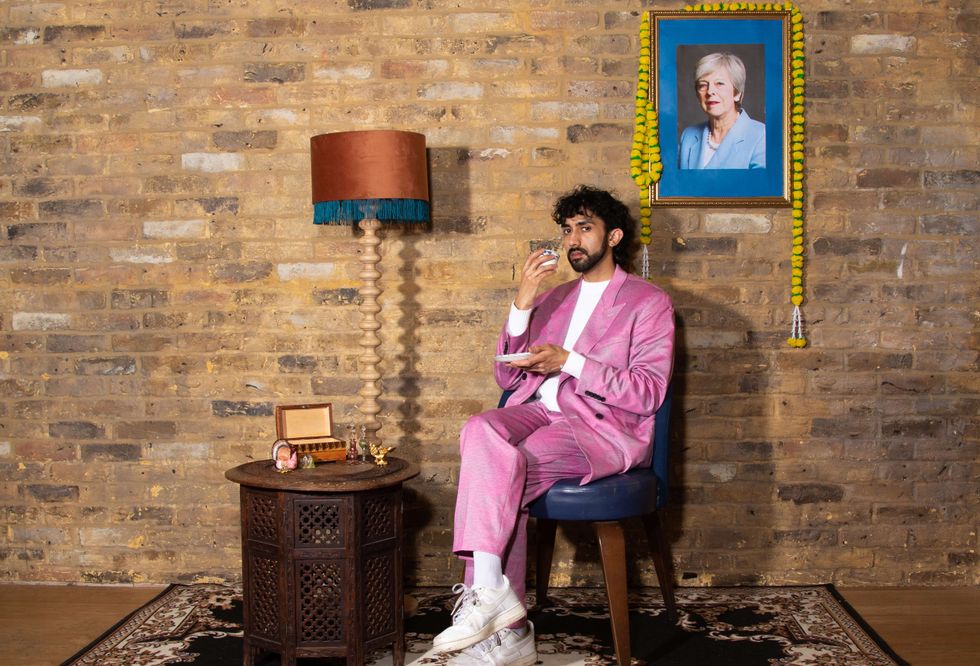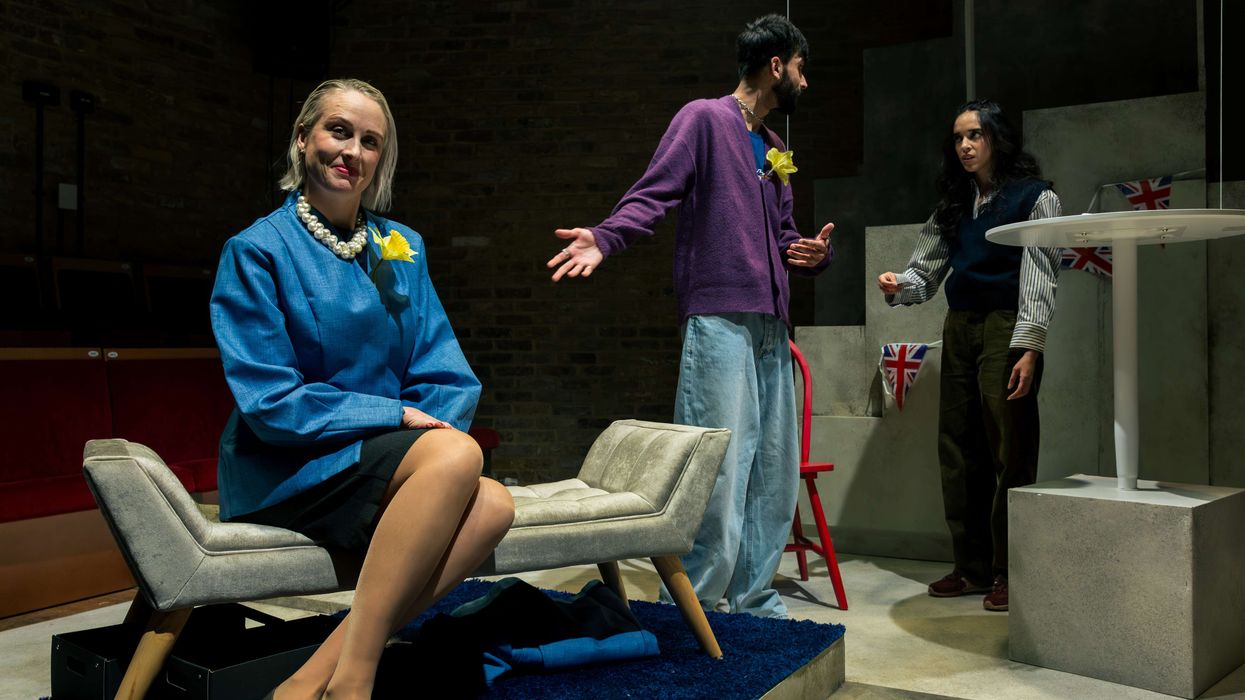AN ASIAN playwright has said his new political satire, I Dream of Theresa May, is an attempt to shine a light on the harsh realities of Britain’s hostile environment immigration policy, and to ask hard questions about identity, belonging and the cost of fitting in.
The play, written by Vivek Nityananda, opened at Tara Theatre last Monday (17) under the direction of Natasha Kathi- Chandra, and features a mostly south Asian cast, including Taraash Mehrotra (Nikhil); Tanya Katyal (Jyoti) and Nusrath Tapadar (Noor).
In an interview with Eastern Eye, Nityananda said he was inspired by his own experiences as an immigrant in the UK, navigating the pressures and prejudices of the hostile-environment policy.
“Even if you’re well-qualified – the kind of immigrant people say the country benefits from – there is still so much pressure,” he said.
Nityananda did not want to portray immigrants simply as victims: his protagonist has agency, ambition, and a complex inner life.
“People are complicated. They have their own politics, their own dreams. Under pressure, all that plays out in unexpected ways,” said the writer, who moved to the UK in 2010 from Bengaluru in southern India for work.

At its heart, I Dream of Theresa May follows Nikhil, a gay Indian man in London struggling to stay in the UK. He is desperate to become a citizen, and he must confront not only the legal obstacles, but also the emotional cost of conforming.
In an unlikely twist, he forms a mentor-mentee relationship with Theresa May (former prime minister and home secretary), who in the play appears to his flat with an offer: she will help him, but only if he meets her exacting standards of “Britishness.”
Set between 2013 and 2018, the years when the hostile environment policy was particularly sharp – the play nevertheless feels more urgent than ever.
Nityananda said, “Things I wrote then take on a new meaning now. The debates around immigration are only more heated, more personal.”
May, who was home secretary from 2010 to 2016 under prime minister David Cameron, said in 2012 that she wanted to “create a really hostile environment for illegal migration.”
The idea was that if it became harder for undocumented migrants to work, rent a home, or use services, they would eventually leave the country on their own.
In the play, Nikhil’s struggles are legal, bureaucratic and also personal.
When he left India, he did so at a moment when being gay was criminalised. “If you go back, you could suddenly be illegal in your own country,” Nityananda explained. But in the UK, he still doesn’t fully belong, either.
The play explores this tension – he is caught between two worlds, neither of which feels completely his, and that becomes part of his internal conflict.
There’s a deep irony, the writer said, in fleeing a colonial-era law only to confront a different kind of exclusion in Britain. “The law that criminalised being gay in India came from colonial rule. You leave that, you arrive in the country it came from, and yet you are still not fully accepted.”
Nikhil’s relationship with May becomes a weird mirror for his dreams and anxieties. Through her, he seeks validation. She challenges him, demands his loyalty, and sets tests – sometimes absurd – for his “British-ness.”
The play blends humour with serious themes. Nityananda said he insisted on using comedy because satire is powerful: “Humour helps people engage with difficult ideas. It opens space for discomfort, but also for reflection.”
While developing the play, Nityananda said there were workshops and research sessions at Live Theatre in Newcastle and at Tara Theatre.

Along with the actors, he discussed how to balance the biting critique with moments of tenderness and absurdity.
Director Kathi-Chandra said she was drawn to the script because it is “deeply personal and funny, but also a searing take on the hostile-environment policy.”
It’s her directorial debut since becoming artistic director of the theatre earlier this year.
The Indian writer said working with Kathi-Chandra was “wonderful”. When he finally saw the completed production on opening night last week, he was deeply moved by how much the staging and performances deepened his original vision.
Beyond the satire, Nityananda hoped the play challenges assumptions about immigrants. He added, “Immigrants are people, not stereotypes. Even so-called ‘legal’ immigrants face huge challenges. It comes back to what notions of Britishness we treasure, and how we allow immigrants to participate fully.”
Nityananda works closely with theatre groups in Newcastle. For him, art offers a freedom politics rarely allows. “Politicians have pressures. Artists don’t. Art can be emotional, truthful and fun — and those things reach people.”
For him, the central question is: how far will someone go to belong? He hoped audiences will leave the theatre thinking not just about policy, but about the human cost of belonging. He said, “Immigrants are not statistics. They’re people with histories, dreams, flaws and contradictions.” He pointed out that the play resonates especially for queer people and ethnic minorities, but believes its themes are universal – compromise, identity, ambition, and belonging.
Nityananda is a senior lecturer and BBSRC David Phillips Fellow at Newcastle University, based at the Centre for Behaviour and Evolution and the Biosciences Institute.
His academic work explores how ecology and evolution influence cognition and behaviour – even in insects. In his writing life, he has produced not only plays, but essays, short stories and a book on overconfidence.
According to the writer, in the current climate, when immigration remains a divisive issue in British politics, I Dream of Theresa May offers something rare: a sharp, deeply personal critique of policy, told through the story of someone who lives its consequences every day.
“The play asks us not just to pity its protagonist, but to understand him, to empathise with his contradictions, his compromises, and his longing,” he said.
“It reminds us that behind every political debate are real lives, shaped by laws, by power, and by the hunger for belonging. If nothing else people come away “laughing and thinking” – and maybe questioning what it really means to be ‘British’.” Why should audiences come? He smiles. “To laugh and to think. These issues are extremely relevant now, and this is a take on immigration we don’t often see.”
I Dream of Theresa May runs untill November 29 at Tara Theatre





